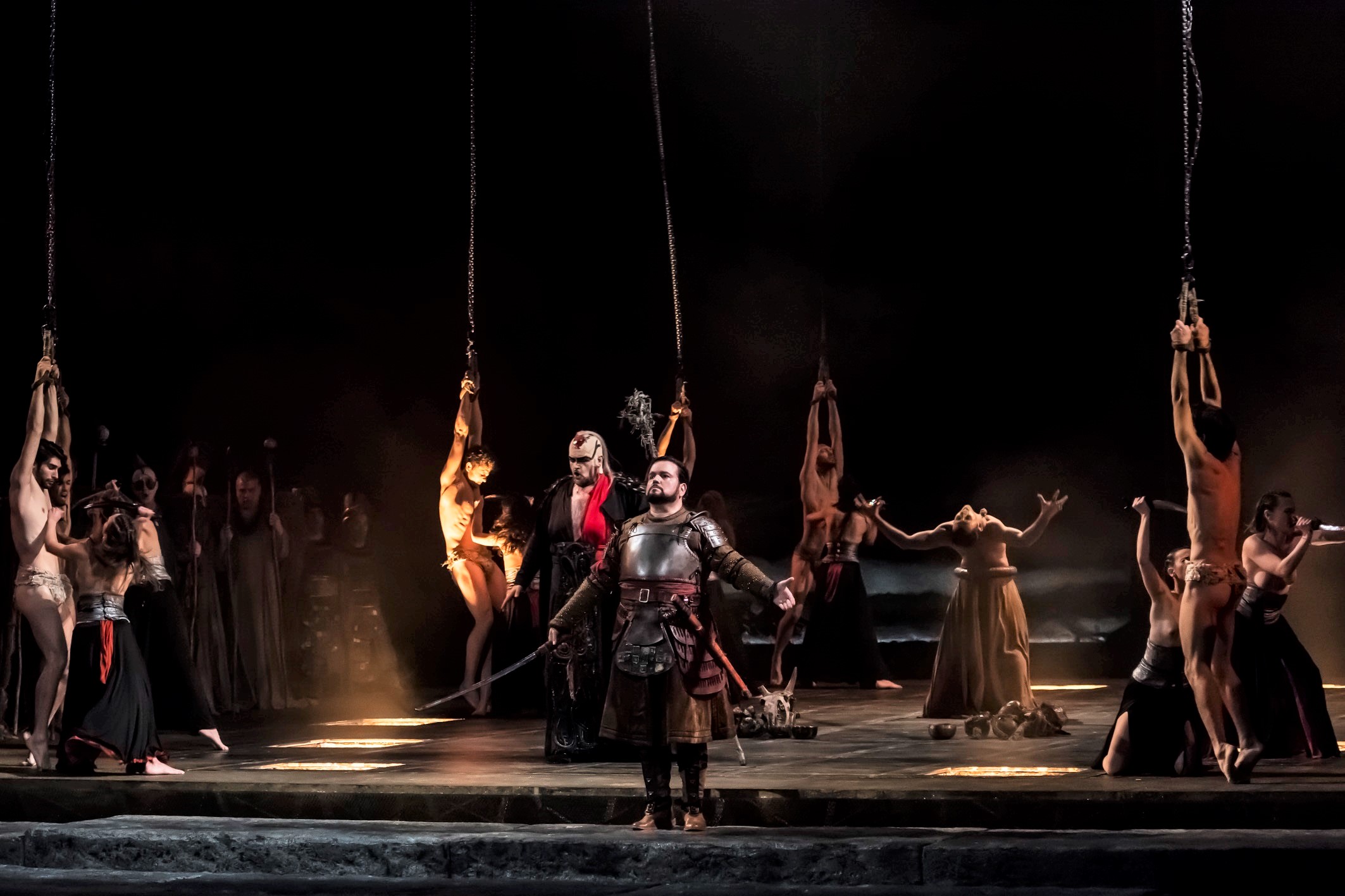 Spain Verdi, Aida: Orquestra de la Comunitat Valenciana, Cor de la Generalitat Valenciana / Ramón Tebar (conductor), Palau de Les Arts, Valencia, 2.3.2016. (JMI)
Spain Verdi, Aida: Orquestra de la Comunitat Valenciana, Cor de la Generalitat Valenciana / Ramón Tebar (conductor), Palau de Les Arts, Valencia, 2.3.2016. (JMI)

Cast:
Aida: María José Siri
Radamés: Rafael Dávila
Amneris: Marina Prudenskaja
Amonasro: Gabriele Viviani
Ramfis: Riccardo Zanellato
King: Alejandro López
Messenger: Fabián Lara
Priestess: Federica Alfano
Production:
Direction: David McVicar (original); Allex Aguilera (revival)
Sets: Jean-Marc Puissant
Costumes: Moritz Junge
Lighting: Jennifer Tipton (original); Nick Havell (revival)
This is a revival of a production that inaugurated the Palau de Les Arts’ 2010-2011 opera season. That earlier Aida was not particularly bright in stage or vocal terms, but the performance made a lasting impression on me: the conducting by Lorin Maazel was truly miraculous. This time, the music did not reach the exceptional level of five years ago, while the staging and singing have not improved.
The McVicar production premiered six years ago in London, and came to Valencia a few months later. In order not to bore readers with a new account of it, here’s a link to my earlier review: http://www.musicweb-international.com/SandH/2010/Jul-Dec10/aida1911.htm I would only add that five years ago parts of the production were dropped, in particular the mutilated corpses that hang from the ceiling in the triumphal scene. Now we have them, and we didn’t really miss anything the first time around.
Leading the musical direction was Valencian Ramón Tebar, who, in addition to fighting with Verdi’s score, had to do battle with my memories of Lorin Maazel. I think Tebar is a solid conductor, and he proved it once again with a careful reading. But he had the disadvantage of slower tempos, especially in the last two acts. Slowing down tempos is not a problem in itself, but it requires a great deal of intensity and depth if tedium is to be avoided. It takes a true genius to do it, which was the case five years ago with Lorin Maazel. Obviously, Tebar is not Maazel, although the musical length of both readings was very similar. In the case of Mr. Maazel it was two hours and forty minutes, while Mr. Tebar’s performance was just seven minutes faster. I remember that in 2010 Valencia had an Aida conducted by Omer Meir Wellber that ran two hours and seventeen minutes. The orchestra again proved their supremacy among Spanish pit orchestras, and I must also highlight the performance of the house chorus.
Aida was performed by Uruguayan soprano Maria Jose Siri, who replaced the previously announced Oksana Dyka. She was a correct, though not great, Aida. Her voice is well suited to the role, but she did not seem comfortable with the top notes of “O, Patria mia.”
Puerto Rican tenor Rafael Dávila was not convincing in the part of Radames. His voice is ample and, in principle, well suited to the demands of the character. Mr. Dávila’s problems reside in his insistence upon open sounds, coupled with a rather dull and unattractive middle range, although the top is brighter. He is not a paragon of expression, and ends up being a Radamés whom one forgets upon leaving the theatre. To his credit it should be noted that he finished “Celeste Aida” in piano (more or less).
Russian mezzo soprano Marina Prudenskaja as Amneris was a compelling stage performer, but less so vocally. Her voice is not very attractive, with the disadvantage that the low notes are almost nonexistent.
Baritone Gabriele Viviani offered an appealing and well-suited voice for Amonasro, although he tends to push at times. Riccardo Zanellato did well as Ramfis.
In the secondary characters, Alejandro Lopez was a King with a sonorous but rather poor voice. Fabián Lara as Messenger was a pleasant surprise; he has a promising future. Federica Alfano did reasonably well as the Priestess.
José M. Irurzun
